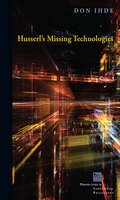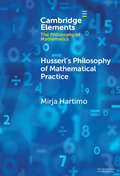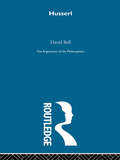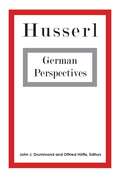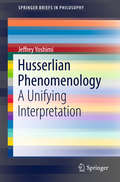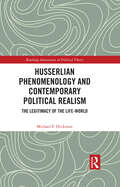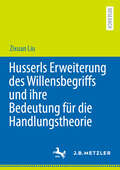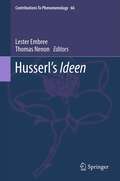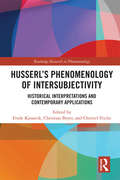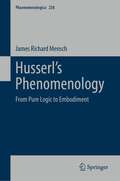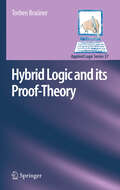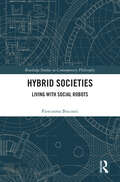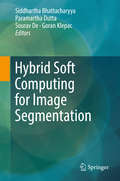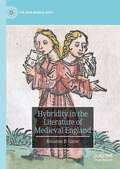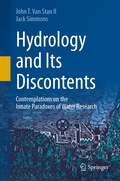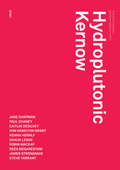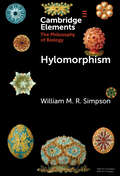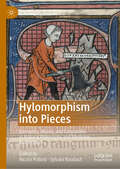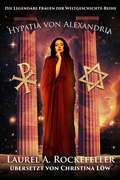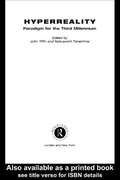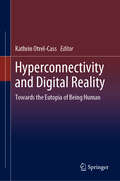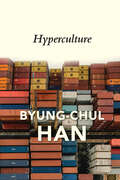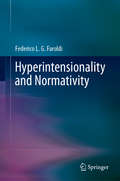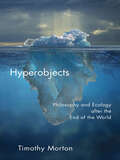- Table View
- List View
Husserl's Missing Technologies (Perspectives in Continental Philosophy)
by Don IhdeHusserl’s Missing Technologies looks at the early-twentieth-century “classical” phenomenology of Edmund Husserl, both in the light of the philosophy of science of his time, and retrospectively at his philosophy from a contemporary “postphenomenology.” Of central interest are his infrequent comments upon technologies and especially scientific instruments such as the telescope and microscope. Together with his analysis of Husserl, Don Ihde ventures through the recent history of technologies of science, reading and writing, and science praxis, calling for modifications to phenomenology by converging it with pragmatism. This fruitful hybridization emphasizes human–technology interrelationships, the role of embodiment and bodily skills, and the inherent multistability of technologies. In a radical argument, Ihde contends that philosophies, in the same way that various technologies contain an ever-shortening obsolescence, ought to have contingent use-lives.
Husserl's Philosophy of Mathematical Practice (Elements in the Philosophy of Mathematics)
by Mirja HartimoHusserl's Philosophy of Mathematical Practice explores the applicability of the phenomenological method to philosophy of mathematical practice. The first section elaborates on Husserl's own understanding of the method of radical sense-investigation (Besinnung), with which he thought the mathematics of his time should be approached. The second section shows how Husserl himself practiced it, tracking both constructive and platonistic features in mathematical practice. Finally, the third section situates Husserlian phenomenology within the contemporary philosophy of mathematical practice, where the examined styles are more diverse. Husserl's phenomenology is presented as a method, not a fixed doctrine, applicable to study and unify philosophy of mathematical practice and the metaphysics implied in it. In so doing, this Element develops Husserl's philosophy of mathematical practice as a species of Kantian critical philosophy and asks after the conditions of possibility of social and self-critical mathematical practices.
Husserl's Transcendental Phenomenology
by Andrea StaitiEdmund Husserl (1859-1938) is regarded as the founder of transcendental phenomenology, one of the major traditions to emerge in twentieth-century philosophy. In this book Andrea Staiti unearths and examines the deep theoretical links between Husserl's phenomenology and the philosophical debates of his time, showing how his thought developed in response to the conflicting demands of Neo-Kantianism and life-philosophy. Drawing on the work of thinkers including Heinrich Rickert, Wilhelm Dilthey and Georg Simmel, as well as Husserl's writings on the natural and human sciences that are not available in English translation, Staiti illuminates a crucial chapter in the history of twentieth-century philosophy and enriches our understanding of Husserl's thought. His book will interest scholars and students of Husserl, phenomenology, and twentieth-century philosophy more generally.
Husserl-Arg Philosophers (Arguments Of The Philosophers Ser.)
by David A BellFirst Published in 1999. Routledge is an imprint of Taylor & Francis, an informa company.
Husserl: German Perspectives (The\a To Z Guide Ser. #166)
by John J. Drummond and Otfried HöffeEdmund Husserl, generally regarded as the founding figure of phenomenology, exerted an enormous influence on the course of twentieth and twenty-first century philosophy. This volume collects and translates essays written by important German-speaking commentators on Husserl, ranging from his contemporaries to scholars of today, to make available in English some of the best commentary on Husserl and the phenomenological project. The essays focus on three problematics within phenomenology: the nature and method of phenomenology; intentionality, with its attendant issues of temporality and subjectivity; and intersubjectivity and culture. Several essays also deal with Martin Heidegger’s phenomenology, although in a manner that reveals not only Heidegger’s differences with Husserl but also his reliance on and indebtedness to Husserl’s phenomenology.Taken together, the book shows the continuing influence of Husserl’s thought, demonstrating how such subsequent developments as existentialism, hermeneutics, and deconstruction were defined in part by how they assimilated and departed from Husserlian insights. The course of what has come to be called continental philosophy cannot be described without reference to this assimilation and departure, and among the many successor approaches phenomenology remains a viable avenue for contemporary thought. In addition, problems addressed by Husserl—most notably, intentionality, consciousness, the emotions, and ethics—are of central concern in contemporary non-phenomenological philosophy, and many contemporary thinkers have turned to Husserl for guidance. The essays demonstrate how significant Husserl remains to contemporary philosophy across several traditions and several generations.Includes essays by Rudolf Bernet, Klaus Held, Ludwig Landgrebe, Dieter Lohmar, Verena Mayer and Christopher Erhard, Ullrich Melle, Karl Mertens, Ernst Wolfgang Orth, Jan Patočka, Sonja Rinofner-Kreidl, Karl Schuhmann, and Elisabeth Ströker.
Husserlian Phenomenology
by Jeffrey YoshimiThis book unifies a large part of the vast body of Husserlian phenomenology using a relatively simple set of dynamical laws. The underlying idea of the book is that a certain core theory of "world-constitution" in Husserl can be formalized and presented in less than 100 pages, with the aid of detailed graphics and quantitative textual analysis. The book is the first to formalize so much of Husserl's work in such a short space. It is both a contribution to Husserl scholarship, and a unique and accessible introduction to Husserlian phenomenology. By making key Husserlian ideas clear and by formally expressing them, it facilitates efforts to apply Husserlian phenomenology in various domains, in particular to cognitive science. The book thus prepares the way for a detailed point-by-point set of connections between Husserl's phenomenology and contemporary cognitive science.
Husserlian Phenomenology and Contemporary Political Realism: The Legitimacy of the Life-World (Routledge Innovations in Political Theory)
by Michael F. HickmanDrawing on Husserl’s concepts of communalization and intersubjectivity, this book aspires to an orientation in which human beings are understood in the context of their full-blooded, concrete existence – the life-world. Michael F. Hickman offers a fresh return to the raw experience of politics through the contemporary realist idea of radical disagreement as the "circumstances of politics." He surpasses realist limitations through the acknowledgment of the constitution of the world as an achievement of the intersubjective community, while crucially asserting that the political horizon is distinguishable from, but coterminous with, the life-world itself. Through the use of hypotheticals, an unprecedented phenomenological account of political experience is offered, in which three major themes of political subjectivity are explored: belonging and possession, authority, and foreignness and political others. Finally, a multi-phase analysis of legitimacy is conducted which, taking into account universal human rights and concretely identifiable expressions of acceptance, is nonetheless rooted in a source – the life-world – that reaches beyond any mere collectivity of ego-acts. Utilizing an expanded philosophical universe, Husserlian Phenomenology and Contemporary Political Realism offers a path forward from the ideological stalemates in which liberal theory seems hopelessly locked. It will appeal to scholars involved in the study of political theory and philosophy, international relations, intercultural studies, human rights and phenomenology.
Husserls Erweiterung des Willensbegriffs und ihre Bedeutung für die Handlungstheorie
by Zixuan LiuHusserls Erweiterung des Willensbegriffs ist eine durchaus beobachtete, aber nicht hinreichend ernst genommene Transformation. Zixuan Liu untersucht in diesem Buch, wie und warum Husserl seinen Willensbegriff erweiterte und was für eine Bedeutung dieser erweiterte Willensbegriff für Husserls eigenes System und die Handlungstheorie haben kann. Zunächst wird Husserls Erweiterung des Willensbegriffs in sechs Richtungen differenziert. Der Erste Weltkrieg stellt sich als der historische Hintergrund dieser Transformation dar. Die Erweiterung liegt unter anderem an Husserls eigener Gedankenentwicklung und dem Einfluss durch andere Autoren. Der Autor untersucht die Herausforderungen des erweiterten Willensbegriffs für Husserls eigenes System. Es ergibt sich die Intentionalität als eine einzigartige Beziehung, die sich nur für Sinngewinnung verantworten muss. Als eine Alternative zu Husserls klassischem intellektualistischem Stufenbau von Erkennen, Fühlen und Wollen argumentiert der Autor für eine aspektuale Ansicht zu dieser Trichotomie. Schließlich versucht Zixuan Liu, mit Husserls Ressourcen kritisch in die handlungstheoretischen Debatten einzugreifen und umgekehrt Husserls Phänomenologie mit der Handlungstheorie zu bereichern.
Husserl’s Ideen
by Lester Embree Thomas NenonThis collection of more than two dozen essays by philosophy scholars of international repute traces the profound impact exerted by Husserl's Meisterwerk, known in its shortened title as Ideen, whose first book was released in 1913. Published to coincide with the centenary of its original appearance, and fifty years after the second book went to print in 1952, the contributors offer a comprehensive array of perspectives on the ways in which Husserl's concept of phenomenology influenced leading figures and movements of the last century, including, among others, Ortega y Gassett, Edith Stein, Martin Heidegger, Aron Gurwitsch, Ludwig Landgrebe, Dorion Cairns, Simone de Beauvoir, Jean-Paul Sartre, Maurice Merleau-Ponty, Jacques Derrida and Giles Deleuze. In addition to its documentation and analysis of the historical reception of these works, this volume also illustrates the ongoing relevance of the Ideen, offering scholarly discussion of the issues raised by his ideas as well as by the figures who took part in critical phenomenological dialogue with them. Among the topics discussed are autism, empathy, the nature of the emotions, the method and practice of phenomenology, the foundations of ethics, naturalism, intentionality, and human rights, to name but a few. Taken together, these specially commissioned original essays offer an unrivaled overview of the reception of Husserl's Ideen, and the expanding phenomenological enterprise it initiated. They show that the critical discussion of issues by phenomenologists continues to be relevant for the 21st century.
Husserl’s Phenomenology of Intersubjectivity: Historical Interpretations and Contemporary Applications (Routledge Research in Phenomenology)
by Frode Kjosavik Christian Beyer Christel FrickeThis collection examines the instrumental role of intersubjectivity in Husserl’s philosophy and explores the potential for developing novel ways of addressing and resolving contemporary philosophical issues on that basis. This is the first time Iso Kern offers an extensive overview of this rich field of inquiry for an English-speaking audience. Guided by his overview, the remaining articles present new approaches to a range of topics and problems that go to the heart of its core theme of intersubjectivity and methodology. Specific topics covered include intersubjectivity and empathy, intersubjectivity in meaning and communication, intersubjectivity pertaining to collective forms of intentionality and extended forms of embodiment, intersubjectivity as constitutive of normality, and, finally, the central role of intersubjectivity in the sciences. The authors’ perspectives are strongly influenced by Husserl’s own methodological concerns and problem awareness and are formed with a view to applicability in current debates – be it within general epistemology, analytic philosophy of language, philosophy of mind, meta-ethics or philosophy of science. With contributions written by leading Husserl scholars from across the Analytic and Continental traditions, Husserl’s Phenomenology of Intersubjectivity is a clear and accessible resource for scholars and advanced students interested in Husserl’s phenomenology and the relevance of intersubjectivity to philosophy, sociology, and psychology.
Husserl’s Phenomenology: From Pure Logic to Embodiment (Phaenomenologica #238)
by James Richard MenschThis text examines the many transformations in Husserl’s phenomenology that his discoveries of the nature of appearing lead to. It offers a comprehensive look at the Logical Investigations’ delimitation of the phenomenological field, and continues with Husserl’s account of our consciousness of time. This volume examines Husserl’s turn to transcendental idealism and the problems this raises for our recognition of other subjects. It details Husserl’s account of embodiment and takes largely from his manuscripts, both published and unpublished, dealing with his theory of instincts, his considerations of mortality and the teleological character of our existence. This book appeals to students and researchers and presents a genetic account of our selfhood, one that unifies Husserl’s different claims about who and what we are.
Hybrid Logic and its Proof-Theory
by Torben BraünerThis is the first book-length treatment of hybrid logic and its proof-theory. Hybrid logic is an extension of ordinary modal logic which allows explicit reference to individual points in a model (where the points represent times, possible worlds, states in a computer, or something else). This is useful for many applications, for example when reasoning about time one often wants to formulate a series of statements about what happens at specific times. There is little consensus about proof-theory for ordinary modal logic. Many modal-logical proof systems lack important properties and the relationships between proof systems for different modal logics are often unclear. In the present book we demonstrate that hybrid-logical proof-theory remedies these deficiencies by giving a spectrum of well-behaved proof systems (natural deduction, Gentzen, tableau, and axiom systems) for a spectrum of different hybrid logics (propositional, first-order, intensional first-order, and intuitionistic).
Hybrid Societies: Living with Social Robots (Routledge Studies in Contemporary Philosophy)
by Piercosma BiscontiThis book explores how social robots and synthetic social agents will change our social systems and intersubjective relationships. It is obvious that technology influences societies. But how, and under what conditions do these changes occur? This book provides a theoretical foundation for the social implications of artificial intelligence (AI) and robotics. It starts from philosophy of technology, with a focus on social robotics, to systematically explore the concept of socio- technical change. It addresses two main questions: To what extent will social robots modify our social systems? And how will human relationality be affected by human–robot interactions? The book employs resources from continental philosophy, actor–network theory, psychoanalysis, systemic theory, and constructivist cognitive theory to develop a theory of socio-technical change. It also offers a novel perspective on how we should evaluate the effectiveness of social robots, which has significant implications for how social robotics should be researched and designed. Hybrid Societies will appeal to scholars and advanced students working in philosophy of technology, AI ethics, robot ethics, and continental philosophy.
Hybrid Soft Computing for Image Segmentation
by Siddhartha Bhattacharyya Paramartha Dutta Sourav De Goran KlepacThis book proposes soft computing techniques for segmenting real-life images in applications such as image processing, image mining, video surveillance, and intelligent transportation systems. The book suggests hybrids deriving from three main approaches: fuzzy systems, primarily used for handling real-life problems that involve uncertainty; artificial neural networks, usually applied for machine cognition, learning, and recognition; and evolutionary computation, mainly used for search, exploration, efficient exploitation of contextual information, and optimization. The contributed chapters discuss both the strengths and the weaknesses of the approaches, and the book will be valuable for researchers and graduate students in the domains of image processing and computational intelligence.
Hybridity in the Literature of Medieval England (The New Middle Ages)
by Rosanne P. GasseHybridity in the Literature of Medieval England offers a wide-ranging exploration of hybridity in medieval English literature. Anxiety about hybridity surfaces in characters of mixed ethnic identity in the romances. But anxiety is found also in the intersection of the natural and the supernatural and its site can be located inside the human body’s unstable physical frame, living and dead, as much as in the cultural and social forces at work upon the human body politic at large. Hybridity is unlike other constructs of difference in that, while it is grounded in difference, hybridity points toward sameness. The four types of hybridity studied in medieval English literature show that hybridity can resolve the problems caused by difference. Understanding medieval hybridity can help us to deal with our own contemporary struggles with the mixtures of our own lives and societies.
Hydrology and Its Discontents: Contemplations on the Innate Paradoxes of Water Research
by Jack Simmons John T. Van Stan IIThis book examines the intricate web linking water science and society using diverse philosophical lenses. Highlighting the tensions within the threads of this web, we spotlight major conceptual tightropes that water researchers tread daily. To effectively navigate these delicate threads, a 'healthy' tension in the encompassing web is necessary. Drawing inspiration from Freud's examination of tensions in "Society and Its Discontents," we illuminate the tension-filled paradoxes inherent to water science, emphasizing the challenges in keeping these paradoxical threads taut enough to ensure a navigable and sustainable bond with society. Central to our narrative is the escalating societal urge to quantify and 'manage' water—something interwoven throughout every environmental layer, including the fabric of our being. An excessive focus on management may alienate users from their water realities, jeopardizing the vital threads that sustainability tether water science and society. Consequently, this book explores compelling and inescapable tensions that resist tidy universal resolution, such as: the language of water science, including its mathematical reductions (i.e., models); the effect of water's commodification on its science; hydrology’s intersection with colonialism; and other concerns that reveal distortions in our hydrology. We aim to aid water professionals in recognizing and fine-tuning the paradoxes intrinsic to their work. To underscore the interwoven complexity of contemporary hydrology, "Hydrology and Its Discontents" guides readers into the tempestuous depths of water research, all the while urging a recalibration of perspectives and motivations.
Hydroplutonic Kernow
by Robin MackayA geophilosophical odyssey through the remains of Cornwall's industrial past offers a historical portrait of geotrauma in action. This unique document provides a pioneering case study in post-“site-specific” geophilosophy. Based on a weird field trip into Cornwall's mining heartlands with geologists, philosophers, and ecologists as guides, Hydroplutonic Kernow drills down through nature, industry, and cultural capital to site the local within the global, unfolding the telluric plots that manipulated populations and devastated the landscape during the industrial age. In doing so, it provides a historical portrait of geotrauma in action.This geophilosophical odyssey takes us through the remains of the region's industrial past, reading them through the twisted prism of the geocosmic theory of trauma espoused by legendary “cryptographer” Dr. Daniel Barker and further developed by Iranian philosopher Reza Negarestani, and uncovering the deep plot of the Hydroplutonic Conspiracy, the collusion between water and the depths of the earth. Along with full documentation of the trip, the book also contains exegetical materials including an essay by Reza Negarestani, a poem by Jake Chapman, a preface by Caitlin DeSilvey, and an in-depth interview with Mining Engineer Steve Tarrant.
Hylomorphism (Elements in the Philosophy of Biology)
by William M. SimpsonThis Element introduces Aristotle's doctrine of hylomorphism, which provides an account of substances in terms of their 'matter' and 'form', adapting and applying it to the interface between physics and biology. It begins by indicating some reasons for the current revival of hylomorphism and by suggesting a way of classifying the confusing array of hylomorphisms that have arisen. It argues that, in order for composite entities to have irreducible causal powers which make a difference to how nature unfolds, they must have substantial forms which transform their matter such that the powers of their physical parts are grounded in the composite entity as a whole. It suggests how a contemporary form of hylomorphism might contribute to the philosophy of biology by grounding the non-intentional form of teleology that features in the identity conditions of biological systems, affirming a real distinction between living organisms and heaps of matter. This title is also available as Open Access on Cambridge Core.
Hylomorphism into Pieces: Elements, Atoms, and Corpuscles in Natural Philosophy and Medicine, 1400–1600 (Palgrave Studies in Medieval and Early Modern Medicine)
by Nicola Polloni Sylvain RoudautFocussing on late medieval and early modern philosophy and medicine, this edited collection explores the replacement of hylomorphism—the dominant theory of bodies in the Middle Ages—with new theories of matter such as corpuscularianism and atomism at the dawn of the Modern period. Together, the contributions offer a comprehensive overview of a crucial historical moment for the history of philosophy and science: the rise of a new conception of matter against declining scholastic theories. They highlight the key aspects of this historical transition by investigating precise concepts that were central to this shift, namely the notions of elements, atoms, and corpuscles. Shedding light on the gradual process by which hylomorphism was eventually replaced by a more positive conception of matter and natural processes, the book demonstrates how many thinkers of the late medieval period were willing to integrate new theories into the conceptual framework of Aristotelian natural philosophy, and tried to harmonise them with the traditional concepts and axioms of scholastic doctrines. Showing how these conceptual innovations resulted from a complex interaction between different fields of late medieval and early modern knowledge, the authors bring together research from the disciplines of metaphysics, medieval philosophy, and medical science. Providing an overview of an important theoretical shift in the transition from the Middle Ages to the Modern Era, this book is essential reading for scholars of philosophy, and historians of medieval and early modern science and medicine.
Hypatia von Alexandria
by Laurel A. RockefellerAls die westliche Welt in Dunkelheit versank, wagte sie, das Licht zu verteidigen. Geboren im Jahr 355 der christlichen Zeitrechnung, im Nachhall von Konstantins Regierung, lebte Hypatia von Alexandria in einem zusammenbrechenden Römischen Reich. In einer Welt, in der der Gehorsam gegen religiöse Autoritäten über die Wissenschaft triumphierte, in der Logik und Verstand die neue Weltordnung bedrohten. Es war eine Welt an der Grenze zum düsteren Mittelalter, eine Welt, die über die Fragen Wissenschaft gegen Religion, Freiheit gegen Strenggläubigkeit, Toleranz gegen Hass entschied. Über vierzig Jahre stand Hypatia zwischen dem dunklen Zeitalter und dem Licht der Philosophie, Künste und Wissenschaft. Auch wenn keines ihrer Werke die offensive Bücherverbrennung religiöser Fanatiker überdauert hat, so bleibt doch ihr Vermächtnis als eine der größten Gelehrten aller Zeiten. Dies ist ihre faszinierende und wahre Geschichte. Das Buch beinhaltet außerdem eine Bibliografie, eine detaillierte Zeitleiste und die Längen- und Breitengrade ausgewählter Städte des Römischen Reiches, sodass Sie die Wunder des Himmels gemeinsam mit Hypatia erkunden können.
HyperReality: Paradigm for the Third Millenium
by John Tiffin Nobuyoshi Terashima'HyperReality is a technological capability like nanotechnology, human cloning and artificial intelligence. Like them, it does not as yet exist in the sense of being clearly demonstrable and publicly available. Like them, it is maturing in laboratories where the question "if" has been replaced by the question "when?" and like them, the implications of its appearance as a basic infrastructure technology are profound and merit careful consideration.' - Nobuyoshi TerashimaWhat comes after the Internet? Imagine a world where it is difficult to tell if the person standing next to you is real or a virtual reality, and whether they have human intelligence or artificial intelligence; a world where people can appear to be anything they want to be. HyperReality makes this possible.HyperReality offers a window into the world of the future, an interface between the natural and artificial. Nobuyoshi Terashima led the team that developed the prototype for HyperReality at Japan's ATT laboratories. John Tiffin studied they way HyperReality would create a new communications paradigm. Together with a stellar list of contributors from around the globe who are engaged in researching different aspects of HyperReality, they offer the first account of this extraordinary technology and its implications.This fascinating book explores the defining features of HyperReality: what it is, how it works and how it could become to the information society what mass media was to the industrial society. It describes ongoing research into areas such as the design of virtual worlds and virtual humans, and the role of intelligent agents. It looks at applications and ways in which HyperReality may impact on fields such as translation, medicine, education, entertainment and leisure. What are its implications for lifestyles and work, for women and the elderly: Will we grow to prefer the virtual worlds we create to the physical world we adapt to?HyperReality at the beginning of the third millennium is like steam power at the beginning of the nineteenth century and radio at the start of the twentieth century, an idea that has been shown to work but has yet to be applied. This book is for anyone concerned about the future and the effects of technology on our lives.
Hyperconnectivity and Digital Reality: Towards the Eutopia of Being Human
by Kathrin Otrel-CassThis book addresses the topic of hyperconnectivity by building on, expanding, and critically examining issues that have to do with information communication technology (ICT) and networked societies. The book explores questions relating to attention and consciousness, techno-capitalism and communicative action taking. Adopting different philosophical angles to assess the challenges we face due to our entanglement with hyperconnected technologies, the book studies performance and performativity in a digitised world by considering the unfolding of our onlife and by looking at what this means to educated future scientists and engineers in a hyperconnected world. The book further discusses digital activities as the new constructs of ourselves and poses questions about how much literacy is needed for us not to be enslaved by those constructs. The book also explores the challenges of hyperconnectivity and the health sector to showcase the vulnerabilities we are increasingly exposed to. It makes clear that - since the boundaries between on- and offline are becoming increasingly blurred - we will require new, flexible frameworks that reconsider what it means to be human in a hyperconnected world.
Hyperculture: Culture and Globalisation
by Byung-Chul HanIn the wake of globalization, cultural forms of expression have become increasingly detached from their places of origin, circulating in a hyper-domain of culture where there is no real difference anymore between indigenous and foreign, near and far, the familiar and the exotic. Heterogeneous cultural contents are brought together side by side, like the fusion food that makes free use of all that the hypercultural pool of spices, ingredients and ways of preparing food has to offer. Culture is becoming un-bound, un-restricted, un-ravelled: a hyperculture. It is a profoundly rhizomatic culture of intense hybridization, fusion and co-appropriation. Today we have all become hypercultural tourists, even in our ‘own’ culture, to which we do not even belong anymore. Hypercultural tourists travel in the hyperspace of events, a space of cultural sightseeing. They experience culture as cul-tour. Drawing on thinkers from Hegel and Heidegger to Bauman and Homi Bhabha to examine the characteristics of our contemporary hyperculture, Han poses the question: should we welcome the human of the future as the hypercultural tourist, smiling serenely, or should we aspire to a different way of being in the world?
Hyperintensionality and Normativity
by Federico L. FaroldiPresenting the first comprehensive, in-depth study of hyperintensionality, this book equips readers with the basic tools needed to appreciate some of current and future debates in the philosophy of language, semantics, and metaphysics. After introducing and explaining the major approaches to hyperintensionality found in the literature, the book tackles its systematic connections to normativity and offers some contributions to the current debates.The book offers undergraduate and graduate students an essential introduction to the topic, while also helping professionals in related fields get up to speed on open research-level problems.
Hyperobjects: Philosophy and Ecology after the End of the World (Posthumanities)
by Timothy MortonHaving set global warming in irreversible motion, we are facing the possibility of ecological catastrophe. But the environmental emergency is also a crisis for our philosophical habits of thought, confronting us with a problem that seems to defy not only our control but also our understanding. Global warming is perhaps the most dramatic example of what Timothy Morton calls &“hyperobjects&”—entities of such vast temporal and spatial dimensions that they defeat traditional ideas about what a thing is in the first place. In this book, Morton explains what hyperobjects are and their impact on how we think, how we coexist with one another and with nonhumans, and how we experience our politics, ethics, and art. Moving fluidly between philosophy, science, literature, visual and conceptual art, and popular culture, the book argues that hyperobjects show that the end of the world has already occurred in the sense that concepts such as world, nature, and even environment are no longer a meaningful horizon against which human events take place. Instead of inhabiting a world, we find ourselves inside a number of hyperobjects, such as climate, nuclear weapons, evolution, or relativity. Such objects put unbearable strains on our normal ways of reasoning. Insisting that we have to reinvent how we think to even begin to comprehend the world we now live in, Hyperobjects takes the first steps, outlining a genuinely postmodern ecological approach to thought and action.
